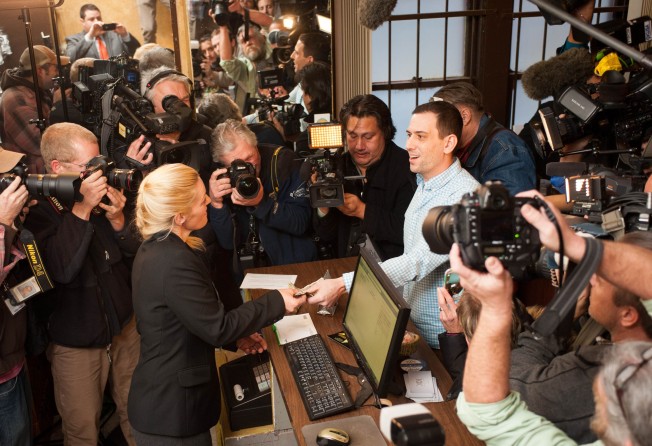Legal marijuana business could turn into America's next corporate giant
Opponents say health damage being ignored in 'Big Tobacco redux'

The people who made a hippy dream come true do not look the part. Instead of tie-dye T-shirts, the campaigners who masterminded the legalisation of recreational marijuana use in Colorado wore dark suits and ties to celebrate the world's first legal retail pot sales. Instead of talking about the counterculture, they spoke of regulations, taxes and corporate responsibility. They looked sober, successful - mainstream.
With Washington state poised to follow Colorado later this year, and activists in a dozen other states preparing to fight for legalisation, a once-illicit plant is now a legitimate industry, complete with advocates, interest groups and lobbyists.
The Marijuana Policy Project, the Drug Policy Alliance, the Medical Marijuana Industry Group and the National Cannabis Industry Association are just some of the groups now vying to shape public opinion and government policy.
For the likes of Diane Goldstein, a former lieutenant commander with the Los Angeles police who became an activist for the group Law Enforcement Against Prohibition, the groundswell of support for legalisation is welcome evidence that society has turned against the drug war. "It's no longer dangerous for people to have a rational view about a failed policy," she said.
But for Dr Kevin Sabet, of the group Smart Approaches to Marijuana which opposes legalisation, the celebratory scenes in Denver pot shops last week is proof that a Big Tobacco-style campaign of manipulation has prevailed.
Many Americans, he said are unaware that cannabis can cause long-term health damage, especially to the young, and that the American Medical Association opposes legalisation. "It's Big Tobacco redux," Sabet said, who also directs the drug policy institute at the University of Florida's department of psychiatry.
What was a fringe movement four decades ago had evolved into a slick, well-funded network based in Washington DC, he said. "It was, 'We need to cut our ponytails, take off our tie-dye shirts, put on our Macy's suits, go to Congress and start lobbying state legislators'."
Sabet argues that the industry has been mimicking the tobacco playbook in portraying its product as virtually harmless while using chemistry and marketing to turn consumers into addicts.
According to Sabet, the cannabis industry comprises a vast coalition of lobbyists, billionaire sponsors like George Soros and profit-seeking investors like Privateer Holdings and the ArcView Group.
Mark Kleiman, drug legalisation expert at UCLA, said the marijuana industry is not a united one with shared interests, and should not be viewed as a single lobbying force.
Many of those who have licences to grow and sell medicinal marijuana, for instance, stand to lose heavily from legalising recreational use because it would expand competition and depress prices, he said. Colorado's medicinal sector obtained exclusive rights to sell recreational cannabis for nine months, a temporary shield, but medicinal growers in Washington state fear disaster.
In contrast to profit-driven industry lobby groups, marijuana's legalisation efforts so far have been led by advocacy groups and funders like Soros who have stood to make little or no financial gain, Kleiman said. "These are not mostly people who are making a living from cannabis and are, therefore, lobbying for laws in their industrial interests."
He said that would probably change with more legalisation and money. "The marijuana lobby is going from being purely ideological to being industrial."